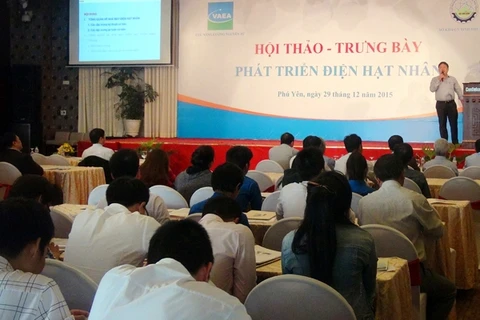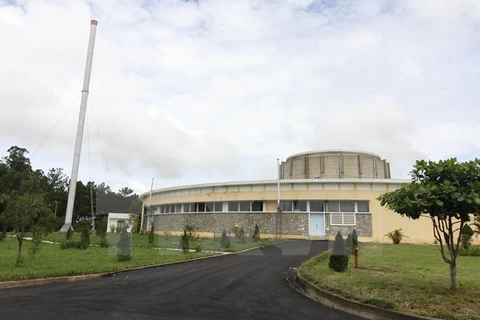Hanoi (VNA) – Vietnam has issued a host of legal documents on atomic energy in order to create a legal corridor for the safe and efficient development of nuclear power.
They include the Law on Atomic Energy, which was approved by the National Assembly on June 3, 2008 and took effect on January 1, 2009, with the Prime Minister’s Decree No. 07/2010/ND-CP dated January 25, 2010 detailing and guiding the implementation of a number of articles of the law, and Decree No. 906/ND-TTg issued on June 17 ratifying nuclear power development orientations in Vietnam until 2030.
Of note, Decree No. 70/2010/ND-CP dated June 22, 2010 details and guides the implementation of a number of the Law on Atomic Energy relating to nuclear power plants.
Based on the legal documents, the Ministry of Science and Technology (MoST) has issued a string of circulars, including Circular No. 13/2009/TT-BKHCN instructing the assessment of nuclear safety in nuclear power plant areas and Circular No. 23/2010/TT-BKHCN, which tells how to ensure security for radioactive sources, among others.
According to Vuong Huu Tan, head of the MoST’s Vietnam Agency for Radiation and Nuclear Safety, following the nuclear disaster in Japan’s Fukushima prefecture in 2011 Vietnam has paid more attention to issuing documents guaranteeing security and safety during the construction of the first nuclear power plant in the country.
However, he said, a pile of work regarding legal procedures regarding nuclear safety has been left for Vietnam.
Tan further explained that the construction requires investors to be capable of managing and ensuring safety for the plant, and management agencies to be able to perform their supervisory role well.
Vietnam is studying to adjust the Law on Atomic Energy, and set up a management and supervision model over nuclear power, ensuring that the nuclear plant will not be put into operation if it fails to meet safety requirements.
The formation of various legal documents has testified Vietnam’s efforts to ensure the security, safety and efficiency of the nuclear power programme, Tan stressed.
The International Atomic Energy Agency (IAEA) has suggested that countries intending to implement nuclear power programmes fully participate in international treaties regarding atomic energy.
Vietnam has engaged in such international treaties as the Nuclear Nonproliferation Treaty in 1982, the Convention on Early Notification of a Nuclear Accident in 1987, the Convention on Assistance in the Case of a Nuclear Accident or Radiological Emergency in 1987 and the Treaty Banning Nuclear Weapon Tests in the Atmosphere.
Pham Gia Chuong, head of the MoST’s Legal Department, said legal documents on atomic energy in the sphere of nuclear power were diverse, both domestically and internationally.
He suggested Vietnam partake in other international treaties such as the Convention on the Physical Protection of Nuclear Material, the Vienna Convention on Civil Liability for Nuclear Damage and the Convention on Supplemental Compensation for Nuclear Damage.
Since the Law on Atomic Energy took effect, Vietnam has taken active steps to raise public awareness about the role played by atomic energy in peace during national socio-economic development, as well as the importance of the nuclear power programme in ensuring national energy security.
This is the first time Vietnam has issued a specific law adjusting social relations on atomic energy, especially on nuclear reactors and nuclear power plants.
It is a must for Vietnam to adjust and supplement a number of points stipulated in the Law on Atomic Energy that are no longer suitable for the realities of the situation.
The Government, and relevant ministries and agencies should continue issuing documents on atomic energy, complete material and technological facilities, and improve the capacity of State management agencies.
The move aims to build and put the nuclear plant into operation in the coming time while fulfilling the target of building and developing the nuclear technology industry by 2020. It is expected to contribute significantly to national socio-economic development.
Vietnam will start the construction on its first nuclear power plant in the southern central province of Ninh Thuan in 2020, six years later than scheduled.
Ninh Thuan 1 nuclear project will be built with estimated investment of 200 trillion VND (8.9 billion USD). Most of the capital is loaned from Russia.
Once completed, the plant will have a capacity of 4,000MW, contributing between 3 and 4 percent of the total capacity of the national power grid.
Under the country's energy development plan, by 2030 nuclear plants are expected to provide 15,000-16,000MW of power, representing 10 percent of the total installed capacity in Vietnam.-VNA
























